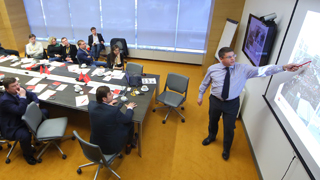
Κοινωνικός διάλογος
Ο κοινωνικός διάλογος μπορεί να οριστεί ως ένα σύνολο διαπραγματεύσεων, διαβουλεύσεων, κοινών δράσεων, συζητήσεων και δράσεων ανταλλαγής πληροφοριών με τη συμμετοχή εργοδοτών και εργαζομένων. Ο κοινωνικός διάλογος, εφόσον λειτουργεί εύρυθμα, αποτελεί βασικό εργαλείο διαμόρφωσης των συνθηκών εργασίας, με τη συμμετοχή διαφόρων φορέων σε ποικίλα επίπεδα. Εξισορροπεί τα συμφέροντα εργαζομένων και εργοδοτών και συνεισφέρει τόσο στην ανταγωνιστικότητα της οικονομίας όσο και στην κοινωνική συνοχή.
Από τον πρόσφατο διάλογο πολιτικής σε επίπεδο ΕΕ προκύπτει ότι, ιδίως μετά την κρίση του 2008, αναδύονται νέες απόψεις για την κοινωνική δικαιοσύνη, τη δημοκρατία, την ποιότητα της εργασίας, καθώς και νέα πρότυπα εργασιακών σχέσεων που θέτουν υπό αμφισβήτηση τα παραδοσιακά συστήματα εργασιακών σχέσεων και κοινωνικού διαλόγου.
Στις 5 Μαρτίου 2015, τριάντα χρόνια μετά την ιστορική έναρξη του ευρωπαϊκού κοινωνικού διαλόγου στο Βαλ Ντυσές των Βρυξελλών, η Επιτροπή επανεκκίνησε τη διαδικασία για μια νέα αρχή για τον κοινωνικό διάλογο στο πλαίσιο μιας εκδήλωσης υψηλού επιπέδου στην οποία συμμετείχαν οργανώσεις κοινωνικών εταίρων από ολόκληρη την Ευρώπη. Ο ευρωπαϊκός κοινωνικός διάλογος είναι ένα εργαλείο της κοινωνικής πολιτικής της ΕΕ, το οποίο συνεισφέρει άμεσα στη διαμόρφωση των πολιτικών και της νομοθεσίας της ΕΕ για την εργασία.
- Εκδήλωση της Ευρωπαϊκής Επιτροπής: A new start for social dialogue (Νέα αρχή για τον κοινωνικό διάλογο)
- Άρθρο στο ιστολόγιο του Eurofound: From Val Duchesse to Riga: how to relaunch social dialogue? (Από το Βαλ Ντυσές στη Ρίγα: πώς επανενεργοποιούμε τον κοινωνικό διάλογο;)
















